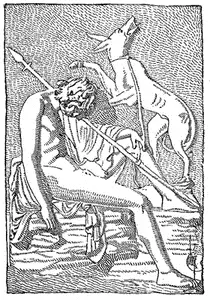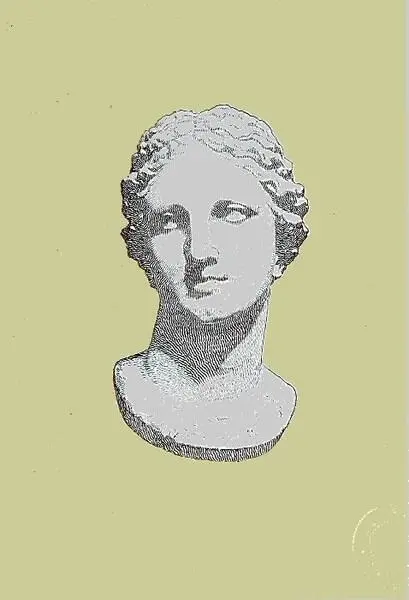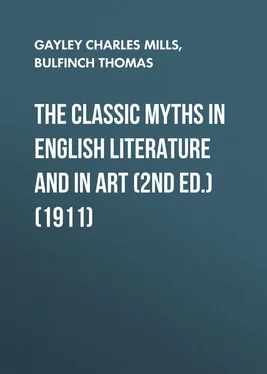Thomas Bulfinch - The Classic Myths in English Literature and in Art (2nd ed.) (1911)
Здесь есть возможность читать онлайн «Thomas Bulfinch - The Classic Myths in English Literature and in Art (2nd ed.) (1911)» — ознакомительный отрывок электронной книги совершенно бесплатно, а после прочтения отрывка купить полную версию. В некоторых случаях можно слушать аудио, скачать через торрент в формате fb2 и присутствует краткое содержание. Жанр: foreign_antique, foreign_prose, на английском языке. Описание произведения, (предисловие) а так же отзывы посетителей доступны на портале библиотеки ЛибКат.
- Название:The Classic Myths in English Literature and in Art (2nd ed.) (1911)
- Автор:
- Жанр:
- Год:неизвестен
- ISBN:нет данных
- Рейтинг книги:4 / 5. Голосов: 1
-
Избранное:Добавить в избранное
- Отзывы:
-
Ваша оценка:
- 80
- 1
- 2
- 3
- 4
- 5
The Classic Myths in English Literature and in Art (2nd ed.) (1911): краткое содержание, описание и аннотация
Предлагаем к чтению аннотацию, описание, краткое содержание или предисловие (зависит от того, что написал сам автор книги «The Classic Myths in English Literature and in Art (2nd ed.) (1911)»). Если вы не нашли необходимую информацию о книге — напишите в комментариях, мы постараемся отыскать её.
The Classic Myths in English Literature and in Art (2nd ed.) (1911) — читать онлайн ознакомительный отрывок
Ниже представлен текст книги, разбитый по страницам. Система сохранения места последней прочитанной страницы, позволяет с удобством читать онлайн бесплатно книгу «The Classic Myths in English Literature and in Art (2nd ed.) (1911)», без необходимости каждый раз заново искать на чём Вы остановились. Поставьте закладку, и сможете в любой момент перейти на страницу, на которой закончили чтение.
Интервал:
Закладка:
Tennyson's reference to the Pleiads, in "Locksley Hall," is of course familiar to all readers.

Fig. 73. Endymion
98. Endymion.The frequent absence of Diana from her duties in heaven is said to have awakened suspicion among the deities of Olympus, who doubted whether she actually occupied these intervals with hunting. It is easy to imagine the satisfaction with which Venus, who so often had been reproached by Diana with her undue fondness of beautiful youths, would welcome news of a corresponding weakness on the part of the cold-hearted and apparently unyielding huntress queen. And such satisfaction Venus once enjoyed, if we may trust the later classical and the modern poets who have identified Diana with Selene, the more ancient goddess of the moon.
For, one calm, clear night Selene looked down upon the beautiful Endymion, who fed his flock on Mount Latmos, and saw him sleeping. The heart of the goddess was unquestionably warmed by his surpassing beauty. She came down to him; she kissed him; she watched over him while he slept. She visited him again and again. But her secret could not long be hidden from the company of Olympus. For more and more frequently she was absent from her station in the sky, and toward morning she was ever paler and more weary with her watching. When, finally, her love was discovered, Jupiter gave Endymion, who had been thus honored, a choice between death in any manner that was preferable, or perpetual youth united with perpetual sleep. Endymion chose the latter. He still sleeps in his Carian cave, and still the mistress of the moon slips from her nocturnal course to visit him. She takes care, too, that his fortunes shall not suffer by his inactive life: she yields his flock increase, and guards his sheep and lambs from beasts of prey. 121 121 Authorities are Pausanias, 5, 1, §§ 2-4; Ovid, Ars. Am. 3, 83; Tristia, 2, 299; Apollonius, and Apollodorus.
Keats, whose Endymion journeys on a mission under sea, thus describes a meeting of the goddess and her lover:
On gold sand impearled
With lily shells and pebbles milky white,
Poor Cynthia greeted him, and soothed her light
Against his pallid face: he felt the charm
To breathlessness, and suddenly a warm
Of his heart's blood: 'twas very sweet; he stayed
His wandering steps, and half-entrancèd laid
His head upon a tuft of straggling weeds,
To taste the gentle moon, and freshening beads,
Lashed from the crystal roof by fishes' tails.
And so he kept, until the rosy veils,
Mantling the east, by Aurora's peering hand
Were lifted from the water's breast, and fanned
Into sweet air; and sobered morning came
Meekly through billows: – when like taper-flame
Left sudden by a dallying breath of air,
He rose in silence, and once more 'gan fare
Along his fated way. 122 122 From the Endymion, Bk. 3.
99. Myths of Venus.Round the goddess of love cluster romances of her own tender passion, of the affairs of the winged Cupid, and of the loves of the worshipers at her shrine. Of the affection of Venus for Mars and of her relations with Anchises, 123 123 § 194.
the father of Æneas, mention is elsewhere made. The following is the myth of Venus and Adonis.
100. Adonis. 124 124 Ovid, Metam. 10, 503-559, 708-739.
The sweetly smiling goddess, playing one day with her boy Cupid, wounded her bosom with one of his arrows. Before the wound healed, she looked upon Adonis, the son of Cinyras and Myrrha, and was captivated by him. She no longer took any interest in her favorite resorts, – Paphos, and Cnidos, and Amathus, rich in metals. She absented herself even from Olympus, for Adonis was dearer to her than heaven. Him she followed and bore him company. She who loved to recline in the shade, with no care but to cultivate her charms, now rambled through the woods and over the hills, girt like the huntress Diana. She chased game that is safe to hunt, but kept clear of the wolves and bears. She charged Adonis, too, to beware of dangerous animals. "Be brave toward the timid," she would say, "courage against the courageous is not safe." Having thus, on one occasion, warned him, she mounted her chariot drawn by swans and drove away through the air. But Adonis was too noble to heed such counsels. The dogs had roused a wild boar from his lair, and the youth threw his spear and wounded the animal with a sidelong stroke. The beast drew out the weapon with his jaws, and, rushing after Adonis, buried his tusks in the lad's side, and stretched him dying upon the plain. The rest of the story is thus recounted:
125 125 From an elegy intended to be sung at one of the spring celebrations in memory of Adonis. Translated from Bion by Andrew Lang. Cypris , Cytherea , and the Paphian refer to Venus. See Commentary. This elegy is also translated by Mrs. Browning and by Sir Edwin Arnold.
… Low on the hills is lying the lovely Adonis, and his thigh with the boar's tusk, his white thigh with the boar's tusk, is wounded; and sorrow on Cypris he brings, as softly he breathes his life away.
His dark blood drips down his skin of snow; beneath his brows his eyes wax heavy and dim; and the rose flees from his lip, and thereon the very kiss is dying, the kiss that Cypris will never forego.

PETWORTH APHRODITE
… She hath lost her lovely lord, with him she hath lost her sacred beauty. Fair was the form of Cypris while Adonis was living, but her beauty has died with Adonis! Woe, woe for Cypris , the mountains all are saying. And the oak trees answer, Woe for Adonis! And the rivers bewail the sorrows of Aphrodite, and the wells are weeping Adonis on the mountains. The flowers flush red for anguish, and Cytherea through all the mountain-knees, through every dell, doth shrill the piteous dirge:
Woe, woe for Cytherea, he hath perished, the lovely Adonis!
… When she saw, when she marked the unstanched wound of Adonis, when she saw the bright red blood about his languid thigh, she cast her arms abroad, and moaned, "Abide with me, Adonis, hapless Adonis, abide!.. Awake, Adonis, for a little while, and kiss me yet again, the latest kiss!.. This kiss will I treasure, even as thyself, Adonis, since, ah, ill-fated, thou art fleeing me, thou art fleeing far, Adonis, and art faring to Acheron, to that hateful king and cruel, while wretched I yet live, being a goddess, and may not follow thee! Persephone, take thou my lover, my lord, for thyself art stronger than I, and all lovely things drift down to thee. But I am ill-fated, inconsolable is my anguish; and I lament mine Adonis, dead to me, and I have no rest for sorrow.
"Thou diest, oh, thrice-desired, and my desire hath flown away as a dream! Nay, widowed is Cytherea, and idle are the Loves along the halls! With thee has the girdle of my beauty perished. For why, ah, overbold, didst thou follow the chase, and being so fair, why wert thou thus overhardy to fight with beasts?"
So Cypris bewailed her, the Loves join in the lament:
Woe, woe for Cytherea, he hath perished, the lovely Adonis!

Fig. 74. The Death of Adonis
A tear the Paphian sheds for each blood-drop of Adonis, and tears and blood on the earth are turned to flowers. The blood brings forth the rose; the tears, the wind-flower.
Читать дальшеИнтервал:
Закладка:
Похожие книги на «The Classic Myths in English Literature and in Art (2nd ed.) (1911)»
Представляем Вашему вниманию похожие книги на «The Classic Myths in English Literature and in Art (2nd ed.) (1911)» списком для выбора. Мы отобрали схожую по названию и смыслу литературу в надежде предоставить читателям больше вариантов отыскать новые, интересные, ещё непрочитанные произведения.
Обсуждение, отзывы о книге «The Classic Myths in English Literature and in Art (2nd ed.) (1911)» и просто собственные мнения читателей. Оставьте ваши комментарии, напишите, что Вы думаете о произведении, его смысле или главных героях. Укажите что конкретно понравилось, а что нет, и почему Вы так считаете.












